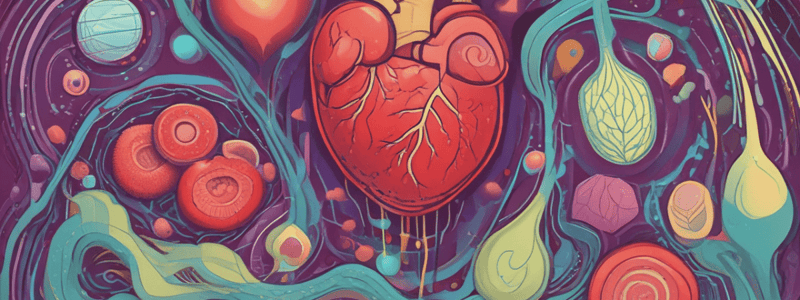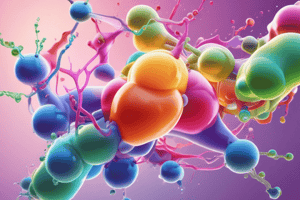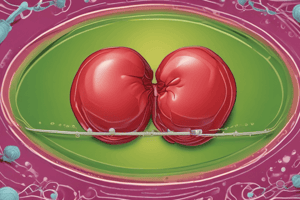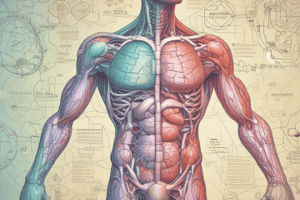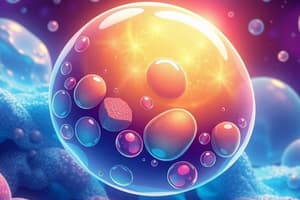Podcast
Questions and Answers
What is the primary function of high-density lipoproteins in the body?
What is the primary function of high-density lipoproteins in the body?
- To deliver cholesterol to body cells
- To store energy
- To remove cholesterol from the blood (correct)
- To synthesize triglycerides
What is the main function of lipids in the body?
What is the main function of lipids in the body?
- To provide energy and store energy (correct)
- To regulate blood pressure
- To synthesize proteins
- To regulate body temperature
What is the characteristic that determines the geometry of fatty acids?
What is the characteristic that determines the geometry of fatty acids?
- Length
- Degree of saturation (correct)
- Degree of unsaturation
- All of the above
What is the primary source of lipids in the diet?
What is the primary source of lipids in the diet?
What is the main role of the fat cells, in addition to energy storage?
What is the main role of the fat cells, in addition to energy storage?
Which signaling molecules can be synthesized using omega-3 and omega-6 fatty acids?
Which signaling molecules can be synthesized using omega-3 and omega-6 fatty acids?
Which of the following is not a precursor for key signaling molecules in the body?
Which of the following is not a precursor for key signaling molecules in the body?
What can happen if individuals do not consume enough fat or have issues with fat absorption?
What can happen if individuals do not consume enough fat or have issues with fat absorption?
Which part of the body expresses receptors for the signaling molecules synthesized from essential fatty acids?
Which part of the body expresses receptors for the signaling molecules synthesized from essential fatty acids?
What is the main reason for considering sterols as lipids?
What is the main reason for considering sterols as lipids?
Which type of molecules do sterols contribute to forming in the body?
Which type of molecules do sterols contribute to forming in the body?
What is the primary structural role of sterols in the body?
What is the primary structural role of sterols in the body?
Where can sterols be sourced from in the diet?
Where can sterols be sourced from in the diet?
What is the main function of cholesterol in the body?
What is the main function of cholesterol in the body?
What is the primary cholesterol-delivery structure in the body?
What is the primary cholesterol-delivery structure in the body?
Which type of lipoprotein can potentially build up in artery walls?
Which type of lipoprotein can potentially build up in artery walls?
Which lipoprotein is often referred to as 'bad cholesterol'?
Which lipoprotein is often referred to as 'bad cholesterol'?
What is the main lipid used for energy in the body?
What is the main lipid used for energy in the body?
Which lipoprotein is often referred to as 'good cholesterol'?
Which lipoprotein is often referred to as 'good cholesterol'?
Flashcards are hidden until you start studying
Study Notes
Lipid Functions
- Lipids are responsible for energy storage and fat-soluble vitamin storage.
- Individuals who don't consume enough fat or have issues with fat absorption are at risk for fat-soluble vitamin deficiencies.
Lipid Structure and Types
- Lipids are hydrophobic molecules that form the precursors for several key molecules in the body.
- Triglycerides, fatty acids, sterols, and phospholipids are all types of lipids.
- Triglycerides have three fatty acids attached to a glycerol backbone, varying in length, degree of saturation, and geometry.
Cholesterol and Sterols
- Cholesterol is a sterol that plays a crucial role in the body, composing about a third of the human cell membrane.
- Cholesterol is a precursor for several important molecules, including vitamin D, estrogen, testosterone, and cortisol.
- The liver and other body tissues can synthesize their own cholesterol, so it is not needed from the diet.
Lipid Transport and Delivery
- Lipids do not dissolve in water, so they need transporters in the small intestine, lymph, and blood.
- Lipoproteins carry lipids around the body, dropping off lipids as needed.
- Chylomicrons and VLDL primarily deliver fatty acids, while LDL primarily delivers cholesterol to body cells.
- HDL removes cholesterol from the blood.
Cardiovascular Health
- Diets high in trans fat are associated with a higher risk of CVD.
- High saturated fat intake is associated with increases in LDL.
- Elevated LDL is associated with a higher CVD risk.
- HDL is associated with a lower risk of CVD.
Lipid Metabolism
- Lipids are one of the three energy-yielding nutrients, providing 9 kcal of energy per gram.
- The main lipid used for energy is the triglyceride.
- Glycerol backbone can be used to synthesize glucose, which can then be metabolized into acetyl CoA.
- Fatty acids also form acetyl CoA by breaking down two carbon atoms at a time through beta-oxidation.
Studying That Suits You
Use AI to generate personalized quizzes and flashcards to suit your learning preferences.
